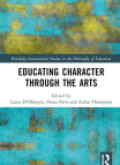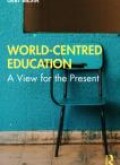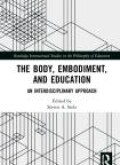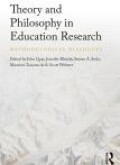News
PESA does not sell or take commission from any of the events listed on this website.
 | D'Olimpio, L., Paris, P., & Thompson, A., Educating Character Through the Arts, (Routledge: London) 2022This volume investigates the role of the arts in character education. Bringing together insights from esteemed philosophers and educationalists, it looks to the arts for insight into human character and explores the arts’ relationship to human flourishing and the development of the virtues. |
 | Gert Biesta, World-Centred Education: A View for the Present, (Routledge) 2021This book makes an intervention in a long-standing discussion by arguing that education should be world-centred rather than child-centred or curriculum-centred. This is not just because education should provide students with the knowledge and skills to act effectively in the world, but is first and foremost because the world is the place where our existence as human beings takes place. |
 | Stolz, Steven, The Body, Embodiment, and Education: An Interdisciplinary Approach, (Routledge: London) 2022Notions of the body and embodiment have become prominent across a number of established discipline areas, like philosophy, sociology, and psychology. While there has been a paradigmatic shift towards this topic, there is a notable gap in the literature as it relates to education and educational research. |
 | Quay, J., Bleazby, J., Stolz, S., Toscano, M., & Webster, S. , Theory and Philosophy in Education Research: Methodological Dialogues, (Routledge: London) 2018The issue of methodology is a fundamental concern for all who engage in educational research. Presenting a series of methodological dialogues between eminent education researchers including Michael Apple, Gert Biesta, Penny Enslin, John Hattie, Nel Noddings, Michael Peters, Richard Pring and Paul Smeyers, this book explores the ways in which they have chosen and developed research methods to style their investigations and frame their arguments. |
 | Stolz, S., & Webster, S. , Measuring Up in Education, (Routledge: London) 2021Cultures of measurement are often considered to dominate educational practices, to the degree that, as Biesta (2010) has identified in Good Education in an Age of Measurement we no longer measure what we value, but rather we have become conditioned to value what is measured. A clear example of this occurs when institutions and staff "teach to the test" by emphasising narrow conceptions of learning and of knowledge, simply because the consequences of high-stakes assessments have important implications regarding funding, resources, and even tenure. |
 | Choo, Suzanne S., Teaching ethics through literature: The significance of Ethical Criticism in a global age, (Routledge) 2021Teaching Ethics through Literature provides in-depth understanding of a new and exciting shift in the fields of English education, Literature, Language Arts, and Literacy through exploring their connections with ethics. The book pioneers an approach to integrating ethics in the teaching of literature. This has become increasingly relevant and necessary in our globally connected age. A key feature of the book is its integration of theory and practice. It begins with a historical survey of the emergence of the ethical turn in Literature education and grounds this on the ideas of influential Ethical Philosophers and Literature scholars. Most importantly, it provides insights into how teachers can engage students in ethical concerns and apply practices of Ethical Criticism using rich on-the-ground case studies of high school Literature teachers in Australia, Singapore and the United States. |
 | Haynes, Bruce, Trust and Schooling, (Routledge) 2020Unlike many current approaches, this book looks at trust relations in order to understand schooling and other social practices. Trust relations include both what an individual is prepared to trust in the circumstances, and what a competent practitioner in an evolving tradition should trust. It is therefore considered whether trust relations are more fundamental in society than those of truth or power. https://www.routledge.com/Trust-and-Schooling/Haynes/p/book/9780367895037 |
 | Freakley, Mark & Burgh, Gilbert, Engaging with ethics: Ethical inquiry for teachers, (Social Science Press: Katoomba) 2000This book adopts a unique approach to the teaching of professional ethics in general and to ethics for schoolteachers in particular. It addresses ethics by inviting the reader to engage with the ethical dimensions of practices pertaining to their profession through the method of the community of philosophical inquiry. This approach to ethics education is designed to help students bridge the gap between theories about ethics and their practical experiences as beginning professionals. The text does not assume that students, or instructors who use it with students, have any formal background in philosophy. Instead, it can be used successfully by anyone prepared to follow the suggestions about how to guide a philosophical discussion. The first part of the book articulates the framework for the approach taken while the second part provides a series of fictional ethical vignettes the main characters of which are schoolteachers and their students. This book should make a valuable resource for teaching about professional ethics at undergraduate and graduate levels, as well as for use in seminars, workshops, and professional development programs for teachers in ethics and philosophy in the classroom. It may also be a source of ideas and teaching material for use with high school students studying ethics. https://search.informit.org/doi/10.3316/INFORMIT.058451038050139 |
 | Burgh, Gilbert; Thornton, Simone, Teaching democracy in an age of uncertainty: Place-responsive learning, (Routledge: Abingdon; New York) 2022The strength of democracy lies in its ability to self-correct, to solve problems and adapt to new challenges. However, increased volatility, resulting from multiple crises on multiple fronts – humanitarian, financial, and environmental – is testing this ability. By offering a new framework for democratic education, Teaching Democracy in an Age of Uncertainty begins a dialogue with education professionals towards the reconstruction of education and by extension our social, cultural and political institutions. |
 | Laverty, Megan J. and Hansen, David T., A History of Western Philosophy of Education, (Bloomsbury: London) 2021"A History of Western Philosophy of Education" is the first comprehensive overview of philosophy of education from ancient times to the present day. With five volumes covering 2500 years of history, this is the definitive reference work on the subject, comprising: https://www.bloomsbury.com/us/a-history-of-western-philosophy-of-education-9781350074668/ |
 | Gregory, Maughn Rollins and Laverty, Megan Jane, Gareth B. Matthews, The Child's Philosopher, (Routledge: London) 2021"Gareth B. Matthews, The Child’s Philosopher" brings together groundbreaking essays by renowned American philosopher Gareth B. Matthews in three fields he helped to initiate: philosophy in children’s literature, philosophy for children, and philosophy of childhood. In addition, contemporary scholars critically assess Matthews’ pioneering efforts and his legacy. |
 | Barnett, R., & Bengtsen, S. S. E., Knowledge and the University: Re-claiming Life, (Routledge) 2020For hundreds of years, knowledge has been central in understanding the university. Over recent decades, however, it is the economic value of knowledge that has come to the fore. Now, in a post-truth world, knowledge is also treated with suspicion and has become a vehicle for ideologies. Knowledge and the University combats all these ways of thinking. Its central claim is that knowledge is of value because of its connection with life. Knowledge is of life, from life, in life and for life. |
